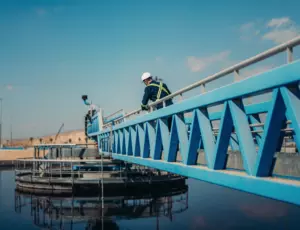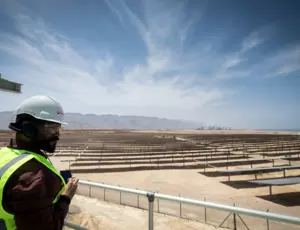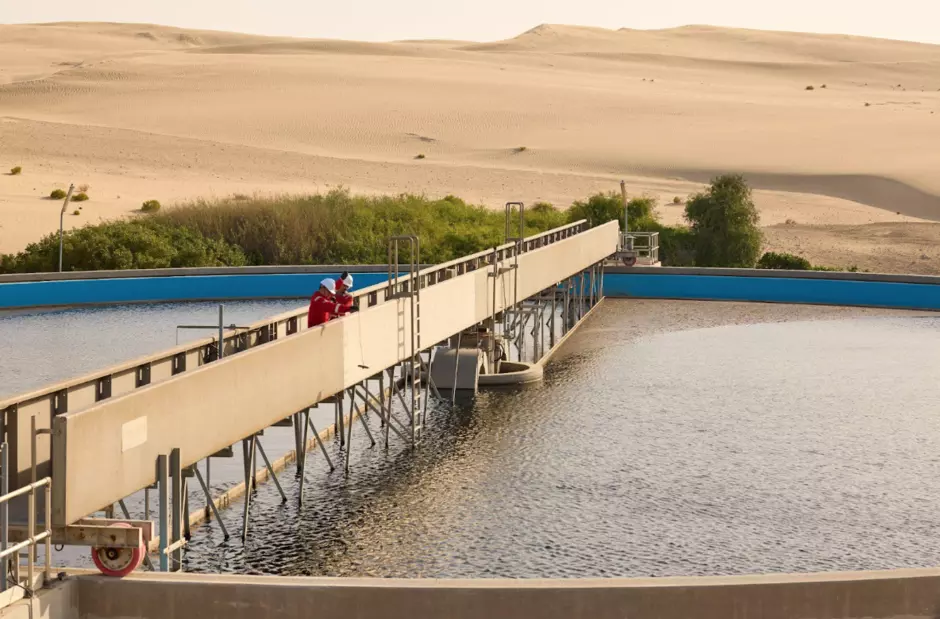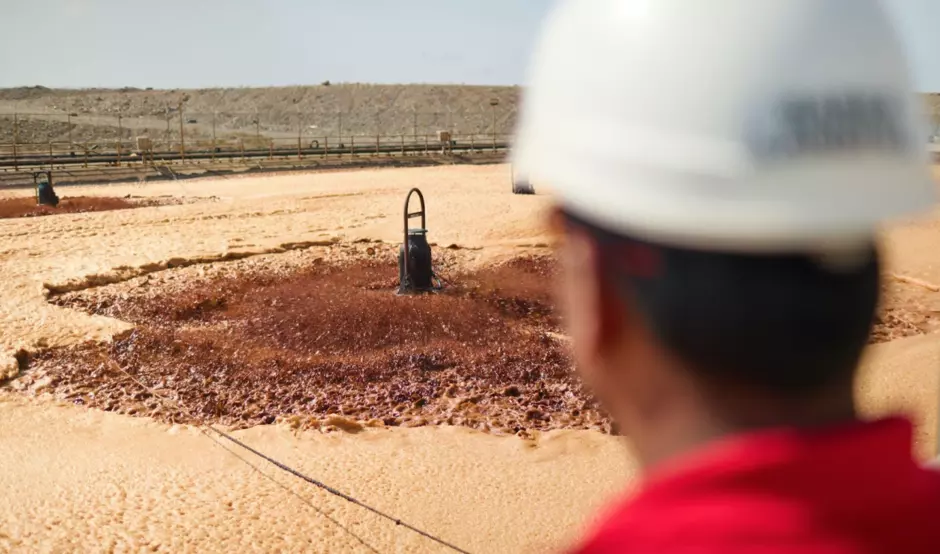The Challenge
Businesses consistently aim to lower waste expenses, leverage waste by-products Veolia faces distinct decarbonization challenges in the Middle East, primarily due to the region's extreme climate and operational demands.
High energy consumption in cooling and water production, particularly in desalination, combined with aging infrastructure and limited renewable energy systems, creates significant hurdles. Additional challenges include traditional energy dependency, substantial investment needs, and rapid urbanization pressures. These regional-specific challenges require innovative solutions while balancing operational efficiency with environmental goals.
Solutions
Veolia marks a historic achievement as the first company to receive dual climate commitment validation from SBTi and Moody's, following the launch of its strategic GreenUp decarbonization program.
SBTi has recognized Veolia's net-zero ambition as the most ambitious among tracked organizations, while Moody's awarded an impressive NZ-2 rating for its transition plan. These validations acknowledge Veolia's effective use of proven technologies and superior return on environmental investments, confirming its leadership in sustainable practices and climate action. Carbon markets in the UAE and Saudi Arabia are still developing, but initiatives launched in 2023 indicate a growing recognition of the need for structured carbon offsetting mechanisms.
Reducing Energy Needs
The journey to Net Zero begins with optimizing energy consumption as the most effective form of sustainable energy management. Veolia's comprehensive approach focuses on reducing overall energy demand through enhanced efficiency measures, utilizing real-time monitoring and smart management systems.
We implement cutting-edge energy-saving technologies across industrial and commercial operations, while investing in advanced digital solutions that track and optimize energy usage to minimize waste. This integrated strategy forms the foundation of effective decarbonization, delivering measurable results through innovative technology and intelligent energy management.
Transitioning to Renewable Energy
Transitioning to renewable energy is crucial for businesses, as they require power to operate even with optimized energy consumption. To achieve this transition, companies can implement various renewable and low-carbon energy sources, such as solar and wind power generation systems, while also exploring green hydrogen production for clean energy and industrial applications.
Additionally, businesses can harness biogas production from organic waste and landfills, and utilize biofuels derived from used cooking oil and other waste sources to further reduce their carbon footprint and ensure sustainable operations.
Carbon Capture & Utilization
Certain industrial processes will inevitably generate CO₂ emissions, making it crucial to focus on capturing and repurposing these emissions rather than releasing them into the atmosphere. Carbon Capture and Utilization (CCU)
Offsetting Residual Emissions
Even after optimizing energy use, transitioning to renewables, and implementing carbon capture solutions, some emissions will inevitably remain, which is where carbon offsetting becomes essential.
Businesses can address these remaining emissions through various strategies, including investing in reforestation and afforestation projects to absorb CO₂ naturally, supporting verified carbon offset programs such as renewable energy projects in developing regions, and purchasing carbon credits to balance out unavoidable emissions.
These offsetting measures serve as a crucial final step in achieving comprehensive emissions reduction goals.

The Future of Decarbonization in MENA
Achieving net zero is one of the most significant challenges facing humanity. There is no single entity that can tackle this alone. Strong partnerships between public and private sectors are critical for advancing decarbonization efforts.For companies in the MENA region, taking action today—whether through energy efficiency, renewables, carbon capture, or offsetting—is no longer an option but a necessity. The journey to net zero starts with informed, strategic choices.
At MENA Impact, we provide the knowledge, community, and resources to help organizations and professionals take meaningful steps toward sustainability.
Feature
details
Over million tons CO2 avoided annually
Overmajor decarbonization projects
targeted reduction by 2030
Overcarbon capture initiatives
OverStrategic partnership
Key
figures
Benefits & Value Proposition

Operational excellence
Operational excellence focuses on three interconnected pillars that drive business success: efficient implementation of processes and systems, continuous performance optimization to achieve maximum productivity, and strategic resource efficiency to minimize waste while maximizing output.
These elements work together to create a streamlined, high-performing operational framework that enables organizations to achieve sustainable growth and maintain competitive advantage.

Support services
Support services encompass a comprehensive suite of assistance, including expert technical consultation for complex challenges, specialized training programs to enhance workforce capabilities, round-the-clock monitoring to ensure continuous system performance, and rapid emergency response capabilities to address any critical situations that may arise.
This integrated approach ensures clients receive complete operational support and peace of mind.

Measurable results
Measurable results are achieved through a comprehensive approach that combines systematic performance tracking with sophisticated data analytics, complemented by regular reporting mechanisms and thorough impact assessments.
This integrated methodology ensures that outcomes are not only monitored and measured effectively but also analyzed and communicated clearly, providing actionable insights for continuous improvement and strategic decision-making.

Long-term value
Long-term value creation is delivered through the implementation of sustainable solutions that stand the test of time, coupled with significant cost savings from optimized operations, continuous efficiency improvements across all processes, and the development of future-ready operations that adapt to evolving market demands.
This comprehensive approach ensures organizations remain competitive while building lasting economic and operational benefits.
Case studies
Discover the experiences of different players in our region








